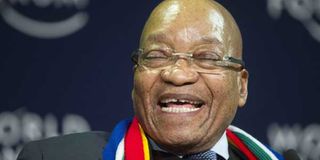Zuma opens door for new Bashir visit as court appeal is rejected

South African President Jacob Zuma. On September 1, 2015, he escaped a bid in parliament to impeach him over the government’s refusal to arrest Sudanese President Omar al-Bashir. President Zuma on September 15, 2015 said Sudanese leader Omar al-Bashir may return to the country, after defying in June an International Criminal Court (ICC) order to arrest Bashir on genocide charges. PHOTO | RODGER BOSCH | AFP
What you need to know:
- A South African court has rejected the government’s request to appeal the ruling that it should have arrested Sudanese President Omar al-Bashir when he was in the country in June.
- The ICC has ordered South Africa to explain by October 5 why it welcomed Bashir at the June summit.
- President Bashir has evaded justice since his indictment in 2009 for alleged crimes in the conflict in the western Sudanese region of Darfur that killed 300,000 people and forced two million to flee their homes.
JOHANNESBURG
South Africa’s President Jacob Zuma Tuesday said Sudanese leader Omar al-Bashir may return to the country, after defying in June an International Criminal Court (ICC) order to arrest Bashir on genocide charges.
Meanwhile, a South African court has rejected the government’s request to appeal the ruling that it should have arrested Sudanese President Omar al-Bashir when he was in the country in June.
Three High Court judges in Pretoria ruled Wednesday that the Implementation Act did not give heads of state immunity from prosecution on criminal charges.
IMMUNITY FROM ARREST
Judge Hans Fabricius said government may not appeal the court ruling that it acted unconstitutionally when it did not arrest President Bashir.
Earlier, President Zuma told diplomats in the capital Pretoria that Sudan was a member of the Forum on China-Africa Cooperation (FOCAC), a meeting between China and 50 African states which will hold its second summit in Johannesburg in December.
“It is expected that the Sudanese government will participate in FOCAC,” President Zuma said. Mr Bashir, who is wanted by the ICC on charges of genocide, war crimes, and crimes against humanity, left South Africa after his controversial visit in June despite a court order barring his departure.
The government has claimed that because President Bashir was attending an African Union summit at the time, he had immunity from arrest.
GIVE AN EXPLANATION
The decision by South Africa not to arrest Bashir sparked international condemnation, which was met with a threat from Pretoria to withdraw its membership with the Hague-based international court.
The ICC has ordered South Africa to explain by October 5 why it welcomed Bashir at the June summit.
“We are currently studying the order. We will then make a determination as to the next course of action, if any,” President Zuma said.
The South African leader has dodged any serious criticism of the Bashir scandal, thwarting an attempt earlier this month by the opposition to impeach him over the saga.
President Bashir is accused of war crimes, crimes against humanity and genocide in Darfur and the International Criminal Court (ICC) wants him to stand trial.
EVADING JUSTICE
However, the controversial leader was able to leave the African Union summit in South Africa in defiance of the ICC’s order to have him arrested.
As a member of the ICC, South Africa was obliged to enforce the court’s arrest warrant.
The Hague-based tribunal has asked South African authorities to submit the reasons for “their failure to arrest and surrender Omar al-Bashir.”
President Bashir has evaded justice since his indictment in 2009 for alleged crimes in the conflict in the western Sudanese region of Darfur that killed 300,000 people and forced two million to flee their homes.




